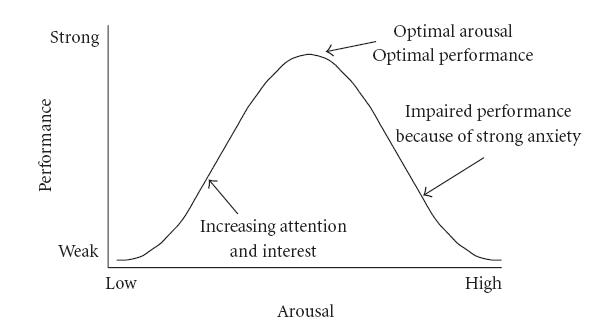Why Stress Is Good For You
Dec 02, 2013
“The mind can go either direction under stress—toward positive or toward negative: on or off. Think of it as a spectrum whose extremes are unconsciousness at the negative end and hyper-consciousness at the positive end. The way the mind will lean under stress is strongly influenced by training.”
Frank Herbert
Do you like to be stressed out?
I bet I know the answer. Most of you probably say no. What if I told you that stress can be a good thing?
More importantly, if you can learn to channel stress this could be a great advantage to you in whatever it is you’re trying to accomplish.
Stress is fundamental to our survival. In fact, it’s paramount to our survival. You’ve all heard of the “fight or flight” response. Without stress, there is no survival. Now, chronic stress = not good. However, acute stress is very important to our success.
In a Stanford Medicine Newsletter article, Associate Professor of Psychiatry and Director of Research at the Stanford Center for Stress and Health, Firdaus Dhabhar, states that “repeated short-term stress is experienced during most day-to-day living situations….it appears that most reasonably healthy people can deal with repeated short-term stressors as long as there are sufficiently long periods when stress-related biological factors are at very low levels.” He then goes on to say that “chronic or long-term stress results when the biological stress response is activated for months or years. It can be due to one long-term stressor, like caring for someone who is chronically ill, or from numerous short-term stressors with insufficient time for a return to a resting state.”
The Yerkes-Dodson law (est. 1908 by psychologists Robert Yerkes & John Dodson) says that there is a distinct relationship between arousal and performance. Think about the last time you had to give a presentation or had some type of project due. Were you stressed? This law essentially says that your performance will increase as stress increases, but only to a point. Check out this image. You’ll see the increase in performance on the left (they Y axis) as the “Arousal” level (or stress level – X axis) increases. Notice the bell curve. There definitely comes a point where performance will decrease as your stress level continues to increase.

Another term you may have heard is Eustress. Of course, you’ve heard of distress, but eustress is a term created by Hans Selye, a Hungarian Endocrinologist. The “Eu” comes from a Greek word meaning either “well” or “good”. So, eustress = good stress. Simply put, eustress is the opposite of distress. Think about working out. You have to put stress on your body to get any type of result. Once you get into this eustress zone, that’s where magic happens. You’re exhausted and fighting through the resistance (i.e. stress) but this is what makes you better. Let me ask you this – how do you feel after a super intense workout? Amazing, right? Your endorphins are firing and you have a strong sense of accomplishment. Were you under stress at all? It’s the good stress that brings about that amazing feeling.
So, the question is, how do we manage this appropriately in our day to day lives?
Here’s the good news. You CAN harness stress to increase performance. Anyone have a fear of speaking in front of others? What is it they say – next to death our greatest fear is public speaking? What if you could actually channel the stress before you speak to maximize your results?
So, three quick tips on how you can use stress to your advantage…
- Awareness – Simply understanding that stress can be a good thing will do wonders for a lot of people. We’re taught at an early age that we should minimize stress at all costs. For example, parents spend a lot of time trying to reduce the stress (and pain) our children experience. While this is important in many regards, it’s also imperative that we teach kids to manage stress. If they can learn this at an early age – look out.
- Welcome it – When you feel the stress, or arousal, coming on, just welcome it in. If you approach acute stress as a positive then you’ll have no problem with this.
- Find stress-release triggers – maybe it’s taking a walk, maybe it’s a killer workout, or maybe it’s doing some breathing exercises. You can even try writing….just write what you’re thinking and go through the worst-case scenario. Usually, your worst-case is not as bad as it may seem on the surface. This in itself should reduce your stress. See the additional reading link below for Dr. Andrew Weil’s article on breathing exercises. This could be life-changing for you (I do these – albeit, not enough).
Here’s the bottom line – we tend to despise stress at all costs. Try a different approach. Just try it for a day or for one project. Be aware of it, welcome it and then use it to your advantage.
Thanks for reading. Please leave a comment if you have any advice on how you manage stress in a positive way. You can always share this as well via the links below. Who do you know that can benefit from channeling their stress? Send this to them right now – who knows, it may just change their life.
Additional Reading:
The Relation of Strength of Stimulus to Rapidity of Habit-Formation – Yerkes & Dodson (1908)
Good stress, bad stress – Firdaus Dhabhar, Stanford Medicine (2012)
Breathing: Three Exercises – Dr. Andrew Weil, M.D. (I’ve used this technique and it definitely works)
HELPING YOU LIVE AND LEAD WITH INTENTION
Join the mailing list to receive updates from our team!
Don't worry, your information will not be shared.
We hate SPAM. We will never sell your information, for any reason.

